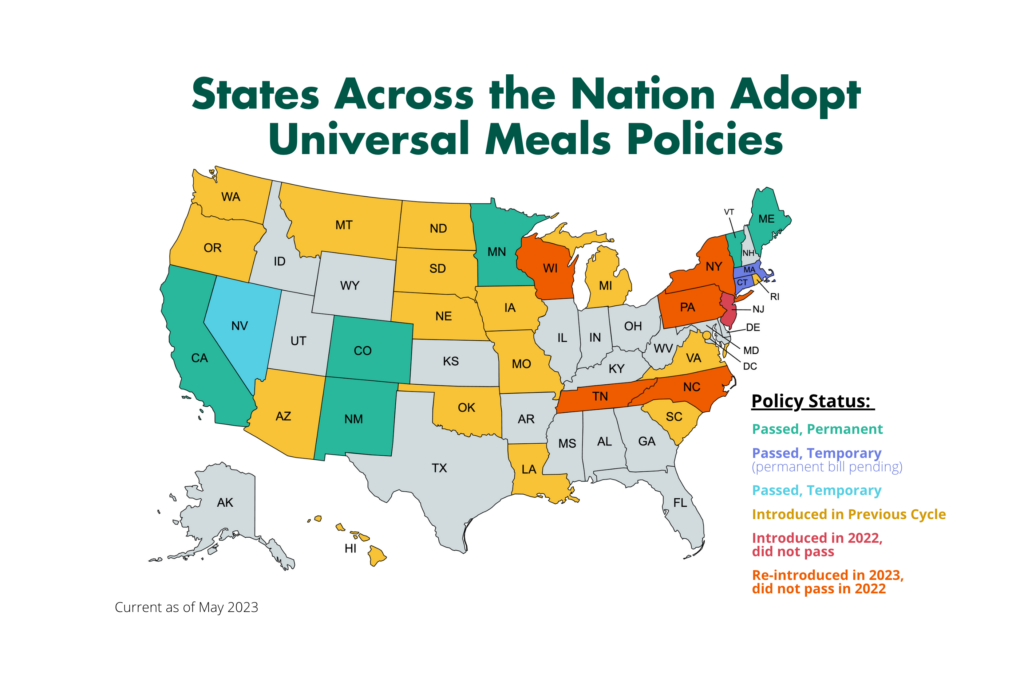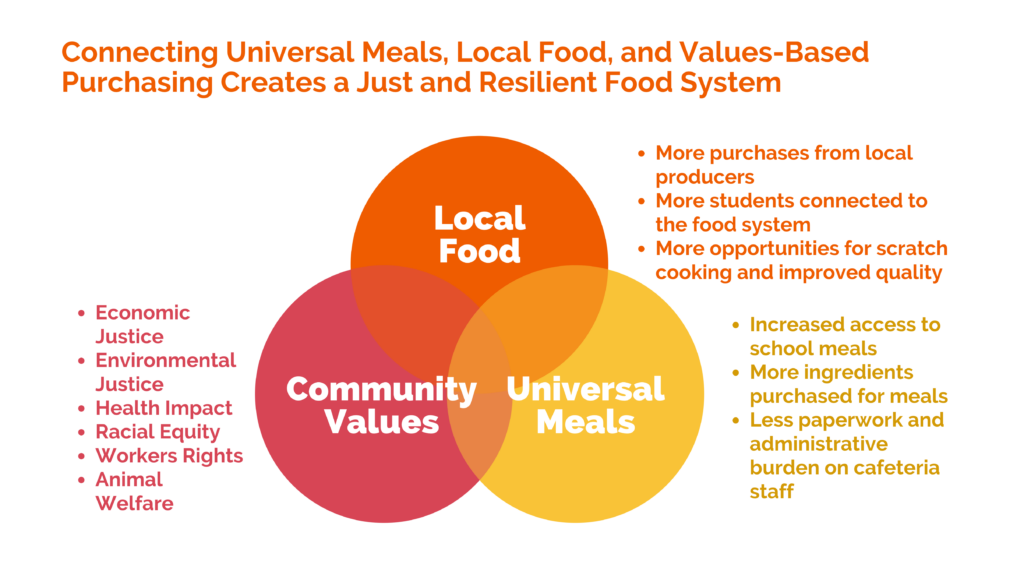This guest blog was by Ryan Betz and Cassandra Bull with the National Farm to School Network (NFSN). NFSN works to increase access to local food and nutrition education to improve children’s health, strengthen family farms, and cultivate vibrant communities. Learn more about NFSN’s work at: www.farmtoschool.org
School meals have long been a critical anti-hunger tool and the pandemic showed just how critical investment in free school meals could be to address inequality and support children. One publicly popular solution is for policy makers to enact state based Universal School Meals policies.
→ Studies have shown that universal free meal policy allows schools to maintain nutritional quality while reducing costs per meal and eliminates the significant administrative burden of tracking which students receive free or reduced price meals.
→ As of May 2023, 6 states have permanent universal meals policies (permanent policies include California, Colorado, Maine, Minnesota, New Mexico, and Vermont) and 3 states have temporary policies (Connecticut, Massachusett, and Nevada).
→ Beyond making sure students are fed, states also have the power to radically transform our food system through intentional policies that feed all children and support local growers with local food purchasing policies.
→ 50% of school districts across the US are small and rural and increased support for local food purchasing is needed in these areas. As a policy tool, universal meal policies with a values-aligned, farm to school focus can be a win for students, farmers, and the local rural economy.
→ If you are a state legislator interested in working on Universal School Meals and Local Food Purchasing policy reach out to SiX at [email protected]
Learn more about the importance of Universal School Meals policies coupled with local food purchasing policy and hear state case studies below!
Alongside broader food system breakdowns during the COVID-19 pandemic, hunger was one of the top challenges that families faced in 2020. In the first year of the pandemic, more than 38 million people struggled with hunger and one in seven households with children could not afford adequate food.
School meals have long been a critical antihunger tool; the pandemic shined a light on the importance of school meals to feed the nation’s children, boost learning and improve quality of life. To broadly address childhood hunger far beyond the pandemic, we can do away with requirements and tiered payment systems and provide free school meals to all students. Nationally, 63% of voters support legislation that would make free school meals permanently available to all students. A 2021 study demonstrated that a universal free meal policy allows schools to maintain nutritional quality while reducing costs per meal. It also eliminates the significant administrative burden of tracking which students receive free or reduced price meals.
As a pandemic emergency measure, the federal government provided funding that allowed schools to provide free meals to all children through June 2022. During this time, schools and families across the nation recognized the community-wide benefits of universal free school meals and began to advocate for a permanent policy. By December 2022, 14 states introduced universal meals legislation to continue healthy school meals for all. Of the 14 states, six successfully enacted universal school meals policies, including three that made universal meals a permanent policy. By May 2023, universal meals took the nation by storm with a total of 31 states and the District of Columbia introducing similar policies. As of May 2023, 6 states have permanent universal meals policies (permanent policies include California, Colorado, Maine, Minnesota, New Mexico, and Vermont) and 3 states have temporary policies (Connecticut, Massachusett, and Nevada).
States have the power to radically transform our food system through intentional policies that feed all children and support local growers.

Universal meals policies can do much more than feed children; they can transform the food system as we know it. Child nutrition programs across the country exercise massive collective purchasing power, serving up to 29.6 million lunches every day and providing $40 billion in human health and economic benefits. The pandemic highlighted the urgency of moving toward a more resilient local food supply that builds racial and social equity. Farm to school is a key strategy in this effort. In both rural and urban settings, we need a system of school meals that serves all kids and values the people who get the food to the table.
Given that more than 50% of school districts across the US are small and rural, increased support for local food purchasing is needed in these areas. As a policy tool, universal meal policies with a values-aligned, farm to school focus are a win for farmers and the local rural economy. Universal meals increase student participation in school meals, bring in more revenue and require more ingredients to be purchased, which provide farmers reliable and consistent sales and fair pay.

States that engage with values-aligned purchasing, local food purchasing, and universal meals policies often see how they come together to create a stronger food system. As part of the School Meals: “Who’s at the Table” campaign, NFSN released a policy brief in December 2022 that demonstrates the connection between farm to school policies and universal meals. Now in May 2023, the correlation is still strong: all states that have passed universal meals policies already had legislation in place that supports local purchasing in schools. These local purchasing incentive programs directly provide schools with additional money to buy local ingredients for school meals. For example, Maine reimburses school districts 33% of the cost of local ingredients through the Local Foods Fund. California and Minnesota’s local food purchasing incentive programs are competitive grant programs, and give priority to applicants that pledge to purchase from emerging producers, young and beginning farmers, and socially disadvantaged farmers and ranchers. California’s Incubator Grant program also prioritizes applicants who plan to purchase from producers with climate-smart agricultural practices.
Even though New Mexico and Colorado already had local food purchasing incentives in place, policymakers expanded the incentive programs through language in their state’s universal meals policy. Two examples:
- Colorado’s Healthy School Meals for All Public School Students Act (HB22-1414) bill gives school districts a grant award to spend on Colorado-raised, grown, or processed products and prohibits schools from spending more than 25% of their award on processed products. The bill also creates a local school food purchasing technical assistance and education grant program that supports training and capacity building for local farmers and producers, cafeteria staff, and schools.
- New Mexico’s Healthy Universal School Meals Act (SB 4) gives additional reimbursement funding to school districts that meet meal quality improvement requirements, which include New Mexico-produced food, scratch-cooked foods, culturally relevant meals, and engaging student and family voices and choices in menu development. SB 4 also requires that schools reduce food waste to the greatest extent possible by creating a standard minimum meal duration and requiring a “share table” for excess food, which can be donated to students, food banks, or other nonprofit charitable organizations.
There is a high potential for co-benefits between values-aligned purchasing, local food purchasing, and universal meals. NFSN has been digging deeper into the design, advocacy, and connection to farm to school in four states that have successfully passed universal meals legislation: Vermont, Maine, Colorado and California. Advocates in each state attribute part of their success to the strong connection their state had with farm to school. This is most likely because in states with local food purchasing policies, there are already coalitions of advocates in place that work together to change laws for the better. Additionally, embedding farm to school in universal meals advocacy can broaden and strengthen the coalition. In fact, supporting local agriculture and rural economic development was cited by advocates as a main tactic to leverage support for universal meals from conservative residents and policymakers. NFSN is sharing this research in a four-part case study series. Case studies on Vermont and Maine are already available for review.
In Colorado, many are excited about the new opportunities to work toward food system transformation. For Colorado small farmer Roberto Meza, the bill’s passage was personal. He shared:
“[the Colorado Healthy School Meals for All bill] hits at the heart of one of the biggest issues I’m trying to solve. How can small-scale farmers provide food in an accessible way… without jeopardizing our own viability? It is difficult for small farmers to compete with some of the larger agriculture corporations. Yet we know that we’re providing the values we need to transform our food systems. We want to provide food that has a net benefit to people, to the planet, to animals. We also want to uplift equity and economic justice in our food system. It means thinking about food in a different way beyond price. And it means a lot that voters supported that.” (Read the full blog here).
Now is the time for states to invest in nourishing school meals for all kids—and value everyone who gets it to their table. An equitable food system that promotes the health of all school children can also strengthen and empower the producers, workers, educators, and their communities who make up that system, and policies that expand healthy school meals with our shared community values benefit us all.
If you are a state legislator interested in working on Universal School Meals and Local Food Purchasing policy reach out to SiX at [email protected]

